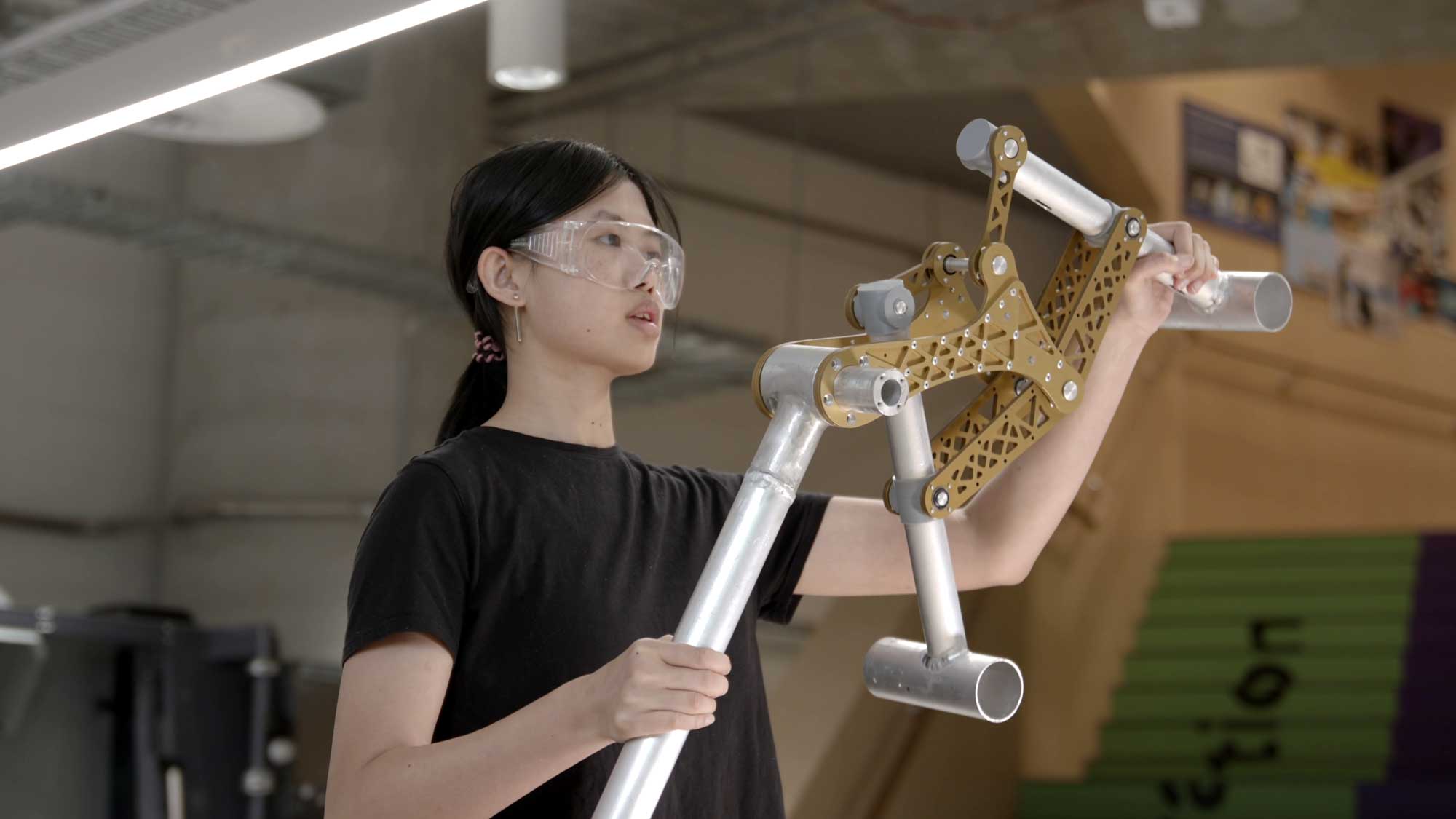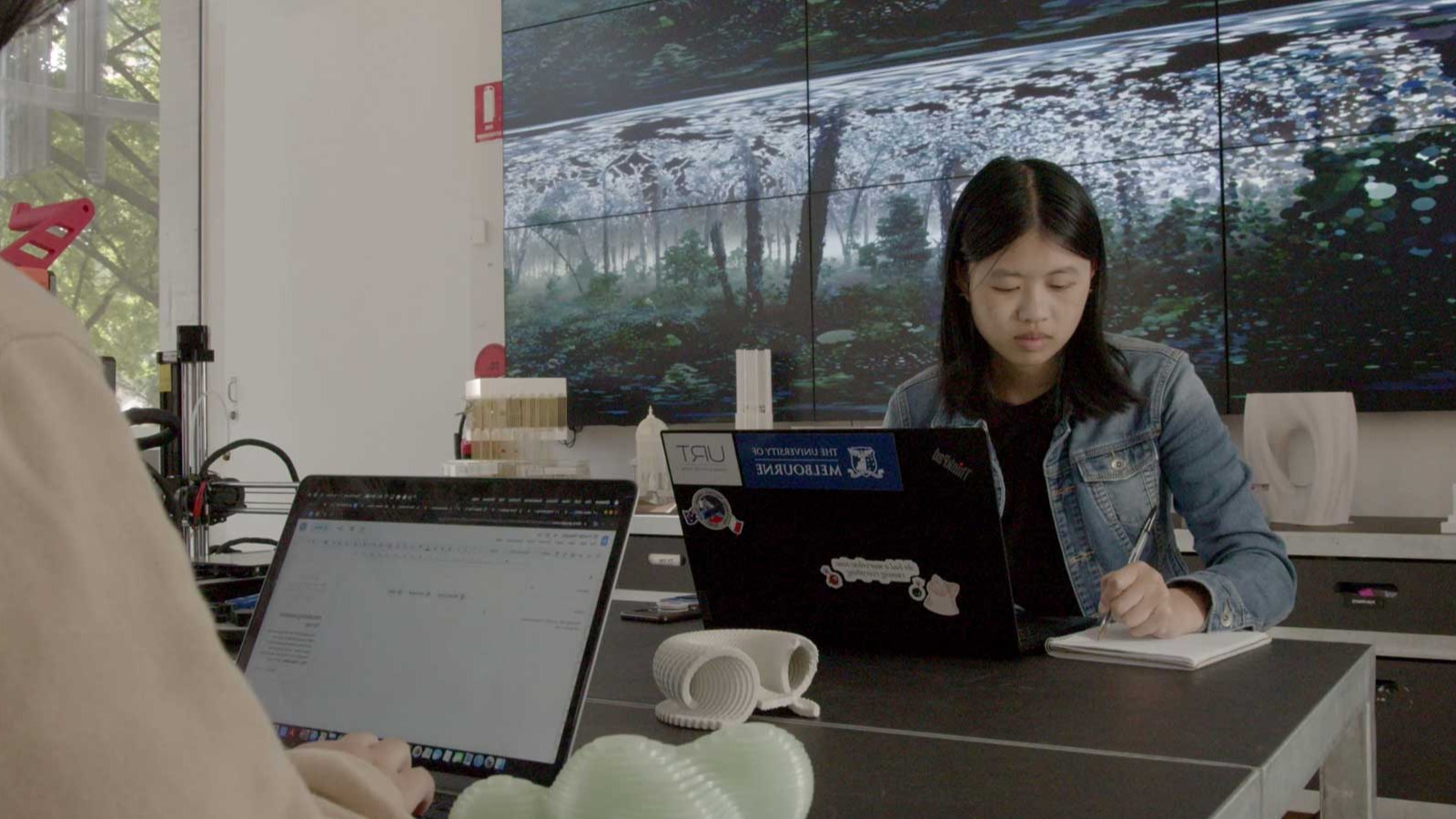Engineering is more than just building bridges. You can work in tech, in infrastructure, or even in space. For Vicki, studying engineering has opened up opportunities as diverse as prototyping with the Telstra Creator Space, industry internships and leading a simulated lunar mission with a robotics rover team.
Moving from New Zealand to study, Vicki chose the Bachelor of Design at the University of Melbourne as it gave her the technical engineering skills in her undergraduate Engineering major, while also letting her experiment with her creativity through a double major in graphic design. Now leading the UniMelb Rover team, Vicki has found new ways to apply what she’s learned to real scenarios. “Studying at Melbourne meant I could do two different disciplines at once. Combining engineering and graphic design in the Bachelor of Design was perfect for me because I was interested in creative arts, design and also in engineering.”
This cross-disciplinary approach to learning is embedded in the Melbourne curriculum, allowing students like Vicki to pursue their unique interests, gain expertise in complementary areas of study and open doors to different careers and industries.
At Melbourne, you can study engineering as an undergraduate in one of 12 majors available through the Bachelor of Biomedicine, Commerce, Design or Science. Undergraduate engineering at Melbourne combines engineering principles with practical experience in designing prototypes, modelling and testing your designs. You’ll then take this knowledge of the first principles of engineering to specialise further in your masters degree.
Studying at Melbourne has taught me to think about why we do things. I’ve learned to look at why we engineer things in a certain way and to look at the equations in the back-end so I can create a tool. It’s that kind of learning that means, when a new tool comes out, I can be adaptable and think about the bigger picture of things.

Vicki’s undergraduate studies equipped her not only with technical expertise but with key skills in teamwork, communication and problem solving – attributes that are essential in the engineers of tomorrow. This broad-based learning provided Vicki the ideal foundation on which to build expertise in her preferred engineering discipline at graduate level.
At Melbourne there are 11 engineering related masters programs for you to choose from. Completing a graduate engineering course enables you to specialise further in your chosen field, gain professional accreditation as an engineer and graduate with a higher qualification than many of your peers with a double degree.
“I always planned on a masters so I could get a globally recognised accreditation, but I also wanted to dive deeper into the knowledge I learned in my undergraduate engineering subjects. I was really interested in subjects like thermodynamics and fluids, so I wanted to study these further. This led me to the Master of Mechanical Engineering. I think my studies have prepared me with foundational knowledge but working in the Telstra Creator Space really built my confidence.”
The Telstra Creator Space offers specialised areas dedicated to different aspects of the creation process. You can bring in your ideas and get industry professionals to help you transform them into prototypes. For Vicki, it meant she could take her designs – either hand-drawn images or 3D software designs, and see how they translated to a prototype.
“Once I started testing my ideas, I felt more confident that I could actually design things better because applying your ideas to a real design changes the way you think about it. I’d never used a drill before, I didn’t know how to solder, but I had this place I could go and learn how to do these things."
It’s this kind of practical experience that helps engineering students from Melbourne stand out in industry because they have skills that can be applied to real-world projects. You can incorporate practical experience into your studies at Melbourne and make the most of our network and partners. Work Integrated Learning (WIL) subjects are designed to provide you with professional experience in your area of interest and develop skills that will enhance your prospects of future work. Internships are also a great way to gain first-hand industry experience and figure out if your dream career is right for you.
In the masters program, engineering students complete a capstone project in their final year. It’s the culmination of their skills and experiences applied to a semester or year-long special project designed to prepare you for life beyond study. For Vicki, this project has been leading the UniMelb Rover Team. While she is specialising in mechanical engineering, she’s been able to work alongside students in different fields of engineering and be part of a national competition.
“I oversee the design process from initial concept to manufacturing and getting ready for the Australian Rover Challenge competition. I think one of the most beneficial parts of the capstone and joining the team is learning from other types of engineers. For example, I’ve got no software engineering knowledge but through the team, I can see how to connect different types of engineering. When I graduate, I won’t only be working with mechanical engineers – so it’s helpful to learn more about other disciplines and integrate everyone’s work together.”
As team leader, Vicki has held workshops to bring team members together - to ensure they’re across all competition requirements and to help everyone work better together as a team. Vicki recalls how the studio subjects in her Bachelor of Design prepared her for this through the presentations she had to do in her Graphic Design major. “Communication and team building skills required aren’t limited to any one field, but show how being able to integrate different types of work and to build something as a team are important skills within any field.”
Through these hands-on, collaborative learning experiences Vicki has been inspired and challenged to view the world from different perspectives, connect thoughts and ideas, find innovative solutions to problems and put them into practice.
“I like how studying at Melbourne has taught me to think about why we do things. I can look at a tutorial for how to use software, read the instructions, but I’ve learned to look at why software is generated in the first place, or why we engineer things in a certain way and to look at the equations that come behind it, so I can turn it into a tool. It’s that kind of learning that means, when a new tool comes out, I can be adaptable and think about the bigger picture of things.”
